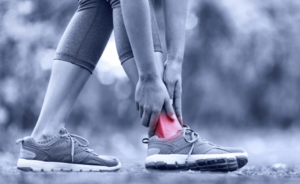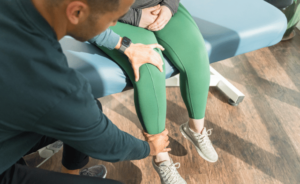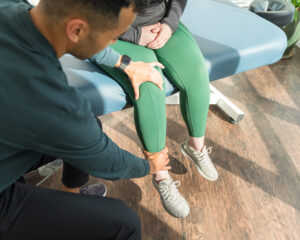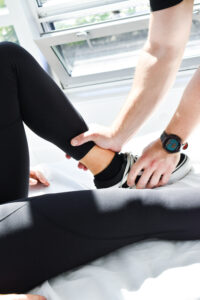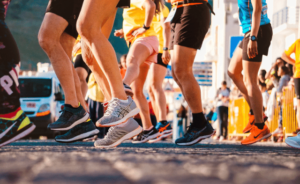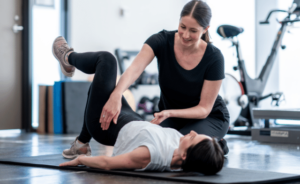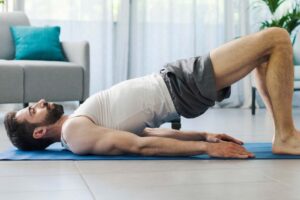expert physio for Running injuries - Vancouver physiotherapy hub
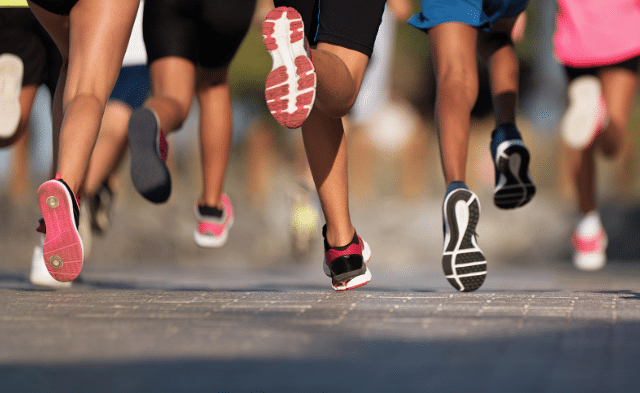
Comprehensive Physiotherapy for Running Injuries in Vancouver
Running is one of the most rewarding and accessible forms of exercise, but it also comes with the risk of injury. Whether you’re training for a marathon, running recreationally along Vancouver’s Seawall, or simply using running as part of your fitness routine, injuries can slow you down—or even stop you in your tracks. If you’re struggling with persistent pain, discomfort, or a sudden injury, we are specialized in running injury physiotherapy, and our treatments are designed to help you recover efficiently and prevent future issues.
At Vancouver Physiotherapy Hub, we specialize in diagnosing and treating common running injuries, such as Achilles tendinitis, plantar fasciitis, runner’s knee, shin splints, and stress fractures. Our sports physiotherapists in Vancouver understand the unique demands of running and offer evidence-based treatment plans tailored to your needs. Whether you’re dealing with knee pain from running, foot or ankle discomfort, or recurring injuries affecting your performance, our expert team can help you regain strength, mobility, and confidence in your stride.
Through a combination of manual therapy, customized rehabilitation exercises, gait analysis, and injury prevention strategies, we target the root cause of your pain rather than just treating the symptoms. Our approach ensures that you don’t just recover—you come back stronger, more resilient, and ready to hit the pavement again.
Located conveniently in downtown Vancouver, our sports physiotherapy clinic offers flexible appointment times to accommodate your busy schedule. Don’t let a running injury keep you sidelined—book your assessment today and take the first step toward pain-free running with expert physiotherapy in Vancouver.
For running injury physiotherapy, we recommend the following:
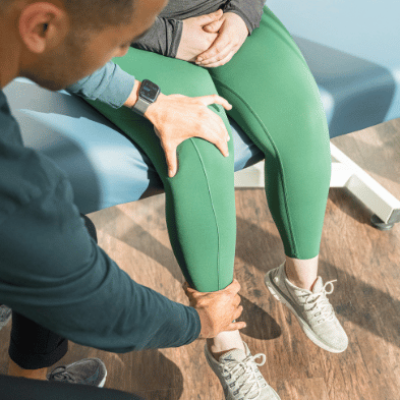
Common Running Injuries: Understanding the Risks
Despite the benefits of running, injuries are common, especially when training errors, improper biomechanics, or muscle imbalances come into play. Many of these injuries are caused by overuse, repetitive stress, or improper running techniques. Without early intervention, minor discomfort can develop into chronic pain, affecting a runner’s performance and overall well-being. Recognizing the symptoms of common running injuries and seeking timely treatment can prevent long-term damage and accelerate recovery. Below are some of the most prevalent running injuries that we treat at Vancouver Physiotherapy Hub.
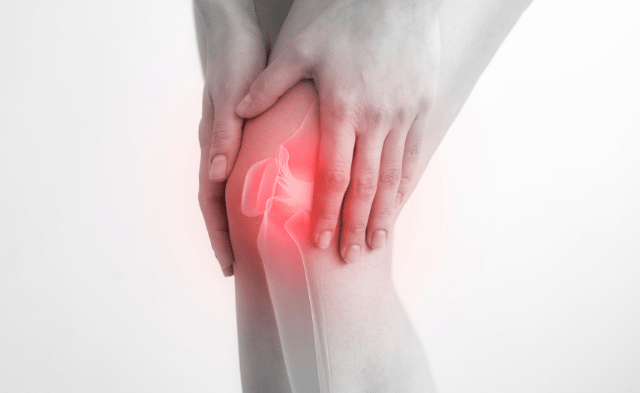
Runner’s Knee (Patellofemoral Pain Syndrome)
Runner’s knee is one of the most frequent complaints among runners, characterized by pain around the kneecap that worsens with prolonged running, squatting, or descending stairs. This condition often results from improper tracking of the patella, weak quadriceps muscles, or overuse due to excessive mileage. In some cases, muscle imbalances or poor biomechanics place additional stress on the knee joint, leading to irritation and inflammation.

Iliotibial (IT) Band Syndrome
IT band syndrome is another common running injury, causing sharp pain on the outer side of the knee due to inflammation of the iliotibial band, a thick band of connective tissue that runs from the hip to the shin. This condition often develops when runners increase their mileage too quickly or fail to incorporate adequate strength training into their routines. Weak hip muscles, poor running mechanics, or excessive downhill running can also contribute to IT band tightness and discomfort.
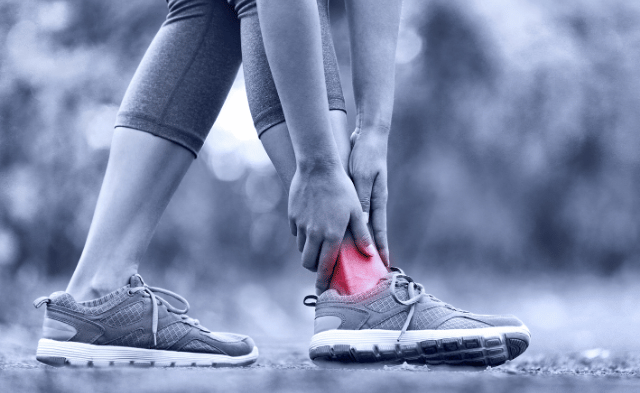
Achilles Tendinitis
The Achilles tendon is the largest tendon in the body, connecting the calf muscles to the heel bone. Achilles tendinitis occurs when this tendon becomes irritated and inflamed due to repetitive stress. Runners who suddenly increase their training intensity, wear improper footwear, or fail to stretch adequately are at higher risk of developing this condition. The pain typically presents as stiffness or soreness in the back of the ankle, which worsens during activity and can become chronic if left untreated.

Shin Splints (Medial Tibial Stress Syndrome)
Shin splints are characterized by pain along the inner shinbone and typically affect runners who increase their training volume too quickly, run on hard surfaces, or wear unsupportive shoes. This condition is caused by repetitive stress on the shinbone and surrounding muscles, leading to inflammation and discomfort. Runners with weak lower leg muscles, improper foot mechanics, or inadequate warm-up routines are more susceptible to shin splints.

Stress Fractures
A stress fracture is a small crack in a bone caused by repetitive impact, often occurring in the shin, foot, or hip. Unlike acute fractures, which result from sudden trauma, stress fractures develop gradually over time due to repeated loading and inadequate recovery. Runners who push through persistent pain or fail to give their bodies enough time to recover are at a higher risk of developing stress fractures.
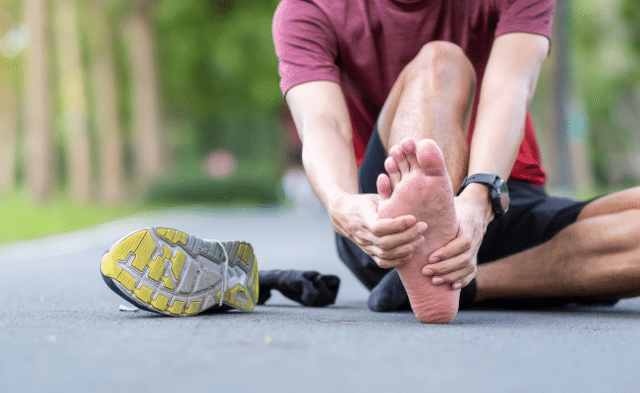
Plantar Fasciitis
Plantar fasciitis is one of the most common foot-related injuries in runners, causing sharp heel pain due to inflammation of the plantar fascia, a thick band of tissue that runs along the bottom of the foot. The condition is often linked to excessive running on hard surfaces, inadequate arch support, or tight calf muscles. Symptoms typically include stabbing pain in the heel, particularly in the morning or after prolonged periods of inactivity.
How Vancouver Physiotherapy Hub Can Help
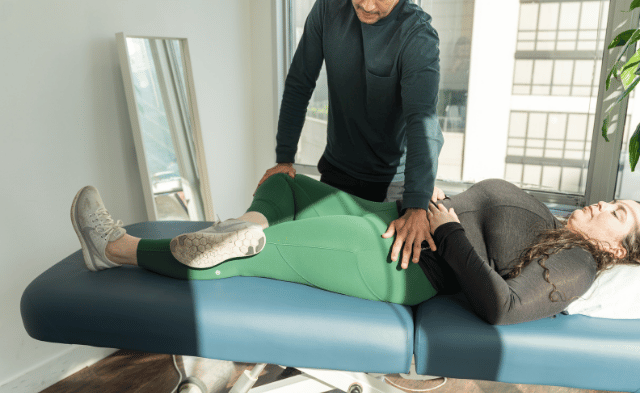
Our clinic offers comprehensive physiotherapy services tailored to the needs of Vancouver runners. Whether you’re a casual runner, weekend warrior, or competitive athlete, we have the expertise to support your recovery and performance goals. Our approach includes:
1. Running Biomechanics Assessment
A professional running assessment helps identify movement inefficiencies that contribute to injury. Our physiotherapists analyze your gait, posture, and muscle activation patterns using video analysis and functional movement screening. By pinpointing weak links and improper movement patterns, we create personalized recommendations to optimize running form and reduce injury risk.
2. Manual Therapy and Soft Tissue Techniques
Manual therapy is a crucial component of rehabilitation, helping to alleviate pain, improve mobility, and enhance tissue healing. Our therapists use:
- Joint mobilizations to restore proper joint mechanics
- Myofascial release to reduce tension in the muscles and connective tissues
- Deep tissue massage to break down scar tissue and adhesions
- Active Release Techniques (ART) to target specific muscle tightness and imbalances
These hands-on techniques support long-term recovery and injury prevention by improving flexibility, blood flow, and muscle function.
3. Strength and Conditioning Programs
Strength training is essential for injury prevention and enhancing running performance. Weak or imbalanced muscles can place excessive stress on joints and soft tissues, leading to repetitive strain injuries. Our strength programs focus on:
- Core stabilization to enhance overall body control
- Hip and glute strengthening to support lower limb mechanics
- Functional movement training to improve efficiency and resilience
- Plyometric exercises to develop power and endurance
By integrating these exercises into your training routine, you can build the strength necessary to sustain higher mileage while minimizing injury risk.
4. Injury Prevention Strategies
Education is a key component of our treatment approach. Many running injuries are preventable with proper technique, footwear, and training modifications. Our physiotherapists provide guidance on:
- Proper Training Load Management: Avoiding overtraining by structuring progressive training programs that allow for adequate recovery.
- Footwear Selection: Recommending the best shoes for your foot type and running style to reduce impact forces.
- Running Form Optimization: Teaching efficient biomechanics to reduce excessive stress on joints and muscles.
Stretching and Mobility Work: Incorporating effective warm-up and cooldown routines to enhance flexibility and muscle recovery.
5. IMS & Dry Needling for Pain Relief
For persistent muscle tightness and trigger points, dry needling is an effective treatment that can reduce pain and improve muscle function. By targeting overactive muscles with fine needles, we help release tension and promote healing in affected areas. This technique is particularly beneficial for runners experiencing chronic pain or muscle tightness that does not respond to traditional stretching or massage therapy.
Related Resources
At Vancouver Physiotherapy Hub, we specialize in treating running-related injuries, including Achilles tendinitis. Our team of experienced physiotherapists uses evidence-based techniques to help runners recover quickly and effectively.
Avoid common training mistakes that lead to injuries & slow race times. Learn how physiotherapy for marathon runners in Vancouver can optimize your performance!
At Vancouver Physiotherapy Hub, we specialize in helping individuals recover from ACL tears through expert physiotherapy services tailored to your needs. Our downtown Vancouver physiotherapy clinic provides cutting-edge treatments designed to restore strength, stability, and confidence. This blog outlines the...Read More »
Running is a cornerstone of Vancouver’s active lifestyle, with breathtaking trails like the Seawall and Grouse Grind attracting thousands of enthusiasts year-round. However, the repetitive motion and impact of running often lead to injuries, with Achilles tendinitis being one of...Read More »
Running in Vancouver offers incredible opportunities, from the scenic paths of Stanley Park to the challenging terrain of the Grouse Grind. However, with the city’s vibrant running community comes the risk of common running injuries, such as Runner’s Knee. If...Read More »
Introduction: Overcoming Achilles Tendonitis for Vancouver Runners Running is a favorite activity for many in Vancouver, whether it’s along the stunning seawall, the trails of Stanley Park, or training for the Vancouver Marathon. But with increased running intensity comes a...Read More »
As one of the leading physiotherapy clinics in downtown Vancouver, we specialize in treating running injuries and preventing them from sidelining your training. Running is popular in Vancouver, thanks to our scenic landscapes and beautiful running trails, from the Seawall...Read More »
Introduction At Vancouver Physiotherapy Hub, we understand that back pain can severely impact your ability to enjoy the active lifestyle that Vancouverites are known for. Whether you’re hiking the North Shore mountains or taking a jog around Stanley Park, back...Read More »
At Vancouver Physiotherapy Hub, we pride ourselves on being at the forefront of health and wellness in downtown Vancouver. Our team of exceptionally talented physiotherapists is dedicated to helping Vancouverites lead active, pain-free lives. Living in a city that embraces...Read More »
Welcome to Vancouver Physiotherapy Hub, your trusted partner in health and wellness located in the heart of downtown Vancouver. Our team of experienced pelvic floor physiotherapists is dedicated to helping you achieve optimal health through personalized care and specialized treatments.
What Our Clients Say About Us
Google Reviews
Get Back to Running Pain-Free
If you’re struggling with a running injury, don’t wait until it worsens. Book an appointment with our expert physiotherapists today and take the first step toward pain-free running.
Visit our downtown Vancouver clinic or book online for expert physiotherapy tailored to runners like you.







